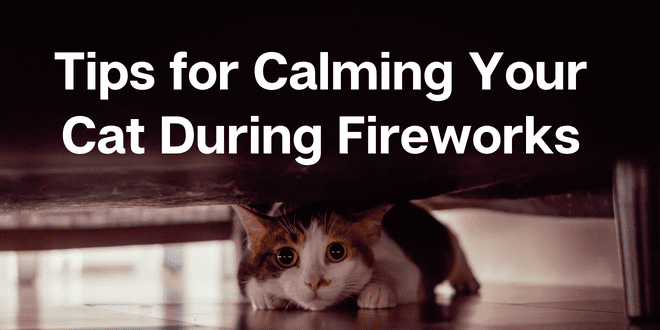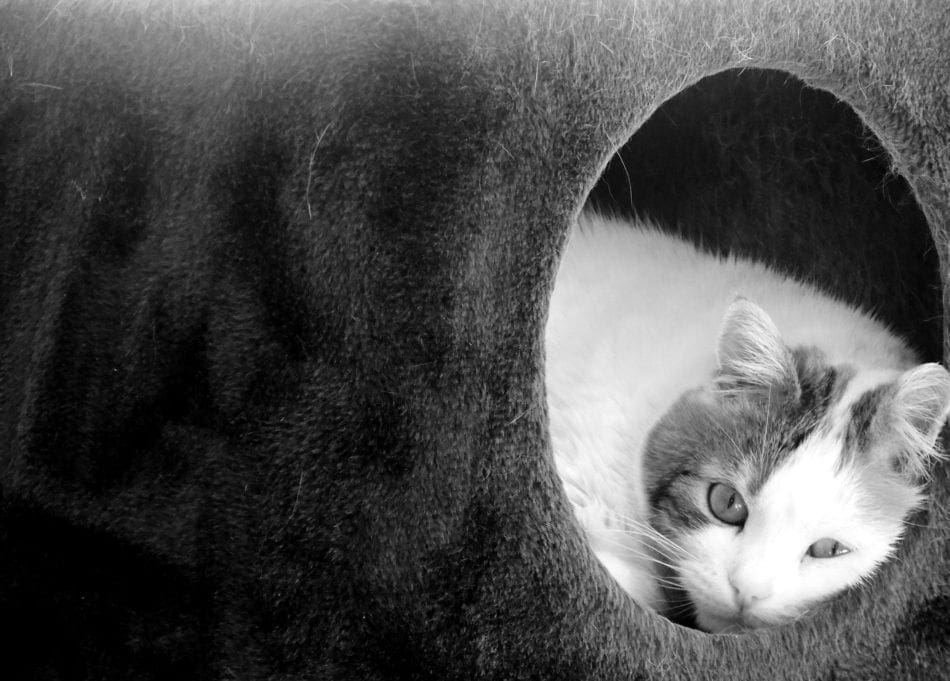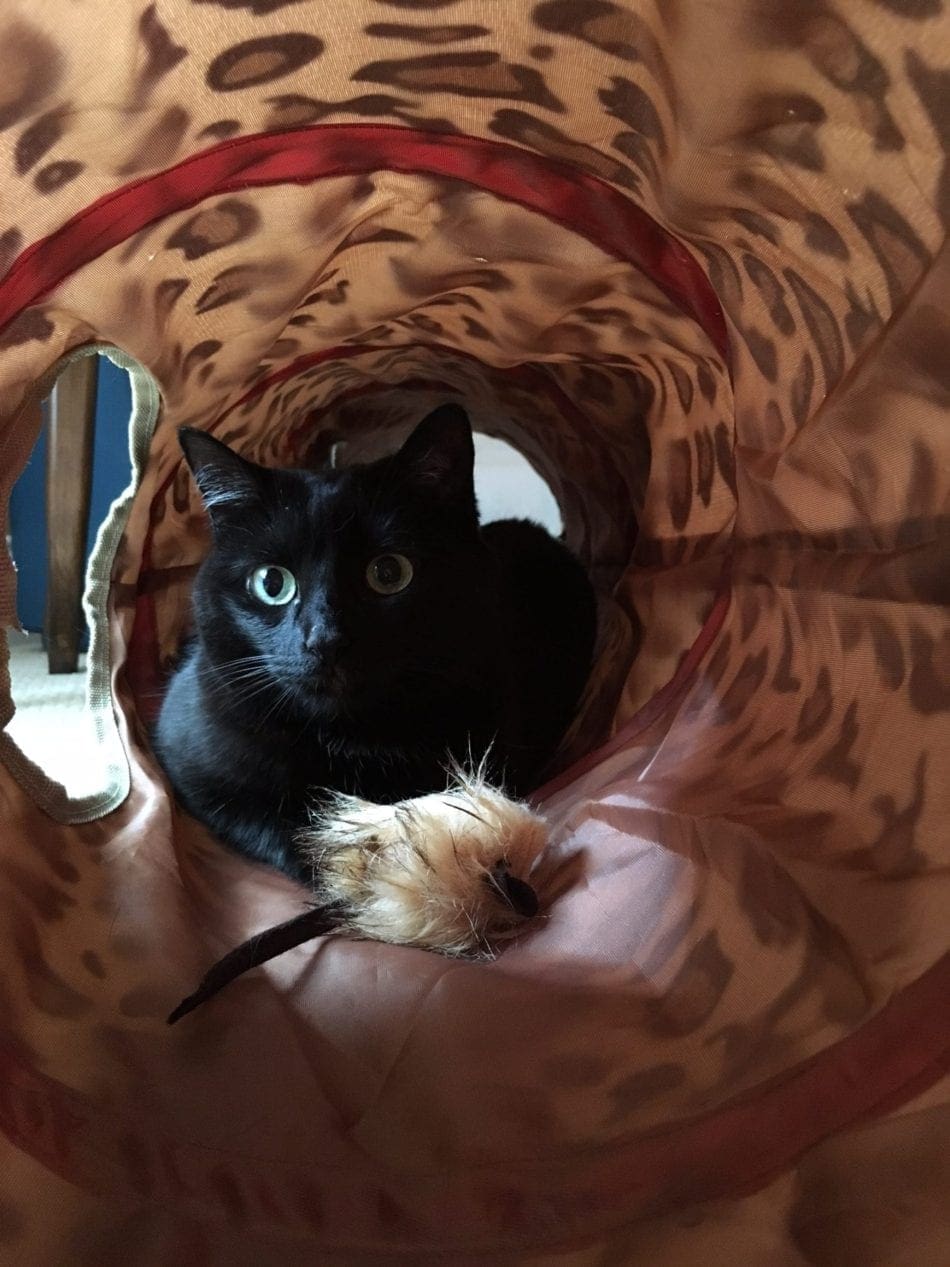
When you think of a pet being fearful of fireworks, the image of a trembling, whining, or barking dog may come to mind, but what about cats? Cats are often also frightened by fireworks.
Some signs that indicate your cat is fearful of the fireworks noise may include:
- Hiding
- Overgrooming
- Not eating
- Trembling
- Panting
- Attempting to escape
- Aggressive behavior
- Excessive vocalization
- Elimination outside of the litter box
- Unable to settle down
- Clingy behavior
It makes sense that July 5th is the busiest day at the shelters due to dogs and cats who have bolted out of their homes in fear or become disoriented and terrified from the sight, smell and sound of July 4th fireworks. New Year’s Eve is another popular time for fireworks.
A time that is festive, fun, and exciting for many people is often terrifying for dogs, cats, horses, other livestock and wildlife. Unfortunately, the fireworks aren’t always confined to just one day either. Your enthusiastic neighbors may begin the personal fireworks celebration several days (or even a week) in advance and continue for days, or weeks, afterward.
Before getting into the calming tips, here’s an important safety tip that should be taken care of if you haven’t already: Have your cat microchipped. Even indoor cats should be microchipped in case of an escape outdoors. ID tags on collars are good but they can become separated from the cat. The safest form of identification is the microchip. The information on the registry should also be up-to-date. Take the time to go to the online registry and double-check that all of your information is current.
It’s also a good idea to have a current picture of your cat. Most cat parents have countless pictures on their phones already but just double-check that you have a clear and sharp picture just in case the unthinkable happens and your cat gets lost. Make sure the pictures you have shows any unusual markings as well.
Here are my tips to help you ease your cat through fireworks fears.
Keep Your Cat Indoors
Even if you normally allow your cat to go outdoors, bring kitty in several days before the 4th in case neighbors start celebrating early. Keep in mind that your cat may try to sneak outdoors or may even bolt in terror during loud noises so be mindful of opening and closing exterior doors.
If bringing an outdoor cat inside, provide an indoor litter box and bring the cat in well in advance of the holiday so you have time to do a more gradual transition to indoor life.
Although you may be very mindful of how to prevent your cat from escaping, other family members may not. Remind them of being more aware of the cat’s location and to be extra cautious when entering and exiting the home. If you have children who may not be as diligent about the cat’s whereabouts, if there is another way to enter/exit the home that reduces the chance of escape, have them use that door.
Stay Home if Your Cat is Frightened by Fireworks
Skip the local fireworks celebration and stay home if your cat is frightened. Even if your cat chooses to hide and not interact with you, it’s safer to be home rather than leave kitty alone. If you plan on being away for the holiday and will be hiring a pet sitter or having a friend care for your cat, it’s safest if they can enter the home in a way that won’t allow an opportunity for the cat to escape out the door. If that’s not possible, instruct them on being extremely careful when entering the house, or for increased security, you can place the cat in a separate area.
Don’t Leave Windows Open
During warm weather, even with secure screens, a cat may be able to escape in a panic. Opened windows also allow too much noise in as well as the smell of the fireworks. Cats have very sensitive noses and the burning scent of fireworks can be disturbing. If you must keep windows open, only open the tops a small amount to prevent a terrified cat from bolting through the screen. A frightened cat can become quite the Houdini, so do a safety check on the condition of all screens as well, even if you only plan on opening the top or bottom an inch or two.
Close Curtains and Blinds Before Fireworks Begin
This is will buffer the sound a tiny bit but will also help with unsettling flashes of light.
Provide a Safe Spot for Your Cat
When frightened, most cats seek out hiding places. Let your cat decide where she is most comfortable. If potential escape is a concern, or you feel a separate room would provide most security, create a sanctuary that has several cozy hiding places in it as well as a litter box and a water bowl. If your cat has a history of being frightened by fireworks or thunderstorms, place her in the room to get settled before all the noise begins. If your cat is terrified, create a tunnel to the litter box so she can get there without feeling too exposed. You can use a cat tunnel you already have or make a temporary one out of papers bags. Cut out the bottoms and tape the bags together to make a long tunnel. tunnels allow the cat to navigate around the room without feeling overwhelming vulnerable. I often use cat tunnels when helping a cat adjust to a new environment as well. It’s amazing how much comfort a few paper bags taped together can provide.

Photo by Thomas Tixtaaz on Unsplash
Create a Cozy Cat Cave
As mentioned previously, let your cat choose the preferred hiding spot but you can also create some comforting hideaways. This way, you provide more options so your cat doesn’t feel as if the only choice is to hunker down in terror under the bed or in the back of the closet. You can purchase cave-style cat beds or easily make your own by stretching a t-shirt over a box. Position the neck-hole of the shirt over the opening of the box. Place the box on its side and line it with a soft towel or fleece pad. An important reason that I like the homemade bed is that you can use a shirt you’ve worn so it has your comforting scent already on it.
In a pinch, even a box placed on the side, lined with a soft towel, and with another towel loosely draped over the opening will be a welcomed hiding place for a cat.
Create a Sound Buffer
Play music or put the television on to create a noise distraction. Some people use white noise but I prefer music or television which is a sound the cat normally associates with typical household sounds. Choose music or a television show that is soothing and play it at a comfortable volume. Don’t try to drown out the fireworks by playing very loud music. Classical music is a good choice as it’s known to have a calming effect. Keep in mind it’s not just the loud bangs that frighten your cat but the whizzing and whistling sounds associated with them as well.
Comfort Your Cat but Let Her Set the Pace
Your cat may want to crawl in your lap and bury her head in the crook of your arm or she may prefer to stay firmly planted in the back of the closet, clearly indicating no interaction is desired. Provide the type of comfort your cat wants. Kitty is frightened and may find reassurance in just being stroked or in simply having you nearby. Comfort in the way your cat prefers and don’t worry about reinforcing any negative behavior by offering love and comfort. Just don’t force physical touch on a cat who clearly doesn’t want it. Pay attention to what works with your cat. If being able to hide undisturbed provides the most security, then let your cat have that option.
Use a Calm Voice and Display Calm Body Language
Your cat is a little emotional sponge who will pick up on the tone of your voice and your physical movements. Be casual and calm as you move around the room and use a soothing tone of voice to let your cat know all is safe in her world.
Offer Fun and Playtime for Your Cat
Your invitation to play may be declined by the cat but give it a try because the game may be enticing enough to distract. You can use a fishing pole-type toy to try to get your cat to engage in playtime or you can offer a couple of food puzzle toys or a Lickimat. Some cats enjoy the distraction but others can’t be redirected toward anything during this time. Let your cat determine what is needed. Gently offer the playtime but don’t insist.

Photo by Pam Johnson-Bennett
Pheromone Therapy
You can set up Feliway pheromone diffusers in the home, or if you’re placing your cat in a sanctuary room, place a single one in there. The product contains synthetic feline facial pheromones which are said to have a calming effect and helps the cat feel more secure in the territory. Plug the diffuser in at least a week before fireworks will start. The diffuser should be placed in an open location with good air flow so don’t plug it in behind furniture. The Feliway diffusers get mixed reviews. Some people think they are a great addition to behavior modification while others don’t feel they have any effect. My philosophy is that if it’s in the budget, using the diffuser can’t hurt and may be a beneficial piece of the puzzle. I use them at my home with my own cat during stressful times such as July 4th.
Calming Medication
Don’t give your cat one of your own anti-anxiety medications because the result could be disastrous. If your cat has a history of being absolutely terrified at this time of year, talk to your veterinarian about whether a prescription is needed. Your veterinarian may recommend an OTC supplement such as Zylkene (works best if started a few days beforehand). Always consult your veterinarian first before administering any anti-anxiety product to your cat, even an OTC one. Zylkene is a supplement that contains alpha-casozepine, which is a hydrolyzed milk protein from cows. It’s lactose-free and helps promotes a calming effect without causing drowsiness. Side effects from Zylkene are uncommon, and even though it’s an OTC product and not a prescription, you should still consult your veterinarian before administering to your cat.
Other Calming Products
Some people have success with using the Thundershirt on their cat. This jacket-type device applies gentle pressure to help calm. If you decide to use it, get your cat comfortable with it in advance of actually needing it. The Thundershirt is not meant to be worn all of the time. Follow the instructions provided with the product. My clients give the Thundershirt mixed reviews. The Thundershirt for dogs has been very effective.
There are also calming collars available for cats. Just as with the Thundershirt, my clients give mixed reviews.
Check Your Yard Afterward for Debris
If you have pets who are allowed outdoors (and especially if you have children) be sure and check around your yard for debris from firecrackers that could be picked up, played with, or ingested.
Need More Information?
For more information on cat behavior and training, refer to the books by best-selling author Pam Johnson-Bennett. Pam’s books are available at bookstores and online. We included links to Amazon here on our website.
If you have a question about your cat’s behavior or health, contact your veterinarian. This article is not intended as a medical diagnosis nor is it a replacement for your cat’s regular veterinary care. This article is for general information purposes only.
 Problem Solving & Advice by Pam Johnson-Bennett Cat Behavior Expert & Best-selling Author
Problem Solving & Advice by Pam Johnson-Bennett Cat Behavior Expert & Best-selling Author



